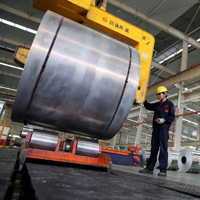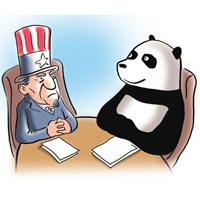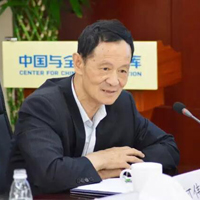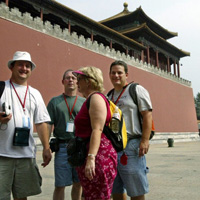-
金灿荣:有条造中国谣的百年东洋暗道
金灿荣,全球化智库(CCG)学术专家委员会专家,中国人民大学国际关系学院副院长、教授、外交学专业博士生导师。“中国人不团结、一盘散沙”的观念对中国知识界、政治界影响颇大,连民国之父孙中山先生都这么说。美国去了100多次,别的国家和地区也有70个左右,就发现跟很多国家比,我们其实团结得多…… 回顾近代史,恐怕中国人感情最为纠结的国家就是日本。近代以前,中国曾经是日本的老师;但近代日本学西方,脱亚入欧,学到了很棒的工业体系,工业化做到世界前茅,一度将中国远远地甩到后面,形成了非常明显的全面工业技术优势。这是个事实,必须尊重和承认,然后谦虚地学习改正。 但问题发生在下一个环节,日本的理论家、政治家、战略家及部分中国知识分子把这一段时间的技术优势解释成了日本文明对中国文明永恒的优势,有一些人甚至直接把它解释成“日本人比中国人强”。 四大文化谎言 上述人群散播其观点的主要途径就是:日本人编造文化谎言,然后由中国有些知识分子一百年来不断重复。 中国人“马马虎虎”。鲁迅临终时对内山完造说:“中国人正患着一种疾病——马马虎虎。‘马马虎虎’若不治疗,就无法救中国。”胡适的《差不多先生传》也在影射这一点。对此,我在没出过国时是同意的,出国后才发现这是日本知识界制造出来的概念。横向对比其他国家,更发现这概念不靠谱:去了美国,发现美国人跟我们一模一样;接着去俄罗斯才发现,那才叫马马虎虎,后来又去巴西和印度,才知道真正马马虎虎的是他们,而且没有底线。中国在大国里面算好的,马虎竟然也被日本人说成是中国人特有的毛病,实在令人难以理解。 中国人“不团结”。“中国人不团结、一盘散沙”的观念对中国知识界、政治界影响颇大,连民国之父孙中山先生都这么说。我之前也觉得这个判断是对的,后来常在世界上来来往往,美国去了100多次,别的国家和地区也有70个左右,就发现跟很多国家比,我们其实团结得多。 中国汉奸世界最多。粉碎这个谣言,我们要拿数据说话。 首先计算一下抗战时期中国的总人口数量。不少人熟悉谭嗣同的诗句“四万万人齐下泪,天涯何处是神州”,就以为民国时期中国总人口为4亿,但事实上这一数字并不准确。距离民国最近的人口调查数据应该在1951年,新中国邀请苏联专家,搞了个真正现代意义上的人口调查,得出中国总人口为5亿。将内战、抗战等战争减员因素考虑在内,民国时期人口数可能超过5亿。 以5亿为人口基数,我们很快可得出400多万抗战时期各种伪军所在总人口的比例——0.8%。 同一时期,被纳粹德国占领的捷克斯洛伐克总共1500万人口,却出了近150万伪军,比例高达10%,法国等地情况不比捷克好多少。 北洋水师大炮上面晾裤衩。“主炮晾衣说”主要出自知名历史学者唐德刚先生的《晚清七十年》,书中记载道:日本东京湾防卫司令东乡平八郎应邀参观丁汝昌率领的来访北洋水师舰艇时,发现中国水兵在两尊主炮炮管上晾晒衣服。然而事实上,除东乡平八郎时任职务有重大错误外,北洋水师主力舰主炮根本不可能作晾衣之用。按照原始设计图,另据打捞上来的致远舰残骸,当时305毫米口径主炮的炮管外径接近半米,距主甲板高度接近3米,平时主炮炮管露出炮罩外的长度不足2米,攀爬到这样高、短、粗的柱子上晒衣服甚为困难,且彼时炮管材质为生铁而非钢铁。 据我了解,上述文字的出处实为当时日本一个反华小说家写的小说。此外,受技术条件限制,近代海军军舰上没安空调,因此各国海军习惯每周设立一个内务日,官兵在军舰上统一打扫卫生、清洗衣物。 类似的谣言还有很多,比如“东亚病夫”等。这些谣言通常由日本学者编出,中国学者进口后再加工,出口再转内销,最后散播开来。谣言也非一无是处 谣言与人性有关,人们在信息交流时,都会有选择性地接收他们想要的信息。因此尽管很多学者努力去寻找,但至今很难找到制造谣言的人。事实上,当下争论谁制造谣言意义不大,更重要的是梳理这些谣言对中国社会的影响。 就动机而言,日本人为保持所谓“种族优越”,制造这些谣言污蔑中国,贬低中国人是一种战略需要。在中国,有意或无意间传播这类谣言的知识分子动机复杂许多:一是对国家及社会现实相当不满,借谣言以泄私愤;二是被这些谣言激发了革命热情,并试图通过传播相关信息,点燃更多人的革命热情。 历史老人的安排确实很奇妙也很吊诡。日本人的批评辱骂反而激发了中国人的革命热情,以鲁迅、李大钊、陈独秀等为代表的进步知识分子不时借日本人之口自我反省旧中国的国民性及社会结构。这股革命热情,在中国共产党上世纪20年代登上历史舞台,马克思主义传入中国后,融入新民主主义革命及社会主义革命的历史洪流。打乱中国的既有社会结构很不容易,没有革命热情,就没有土改等一系列工业革命需要的条件。“日吹”改头换面 21世纪,来自日本的此类谣言并未随着信息时代的到来而消退,“日吹”大有人在。 日本工匠精神源远流长。在上世纪四五十年代,日本产品跟20世纪末的中国产品一样质量不好,东洋货彼时还是劣质代名词。然而受益于美国赐予的“韩战特需”“越战特需”,日本大量引进西方技术改进生产工艺,日本制造终于在上世纪八九十年代成为模范。 日本经济并未“失去20年”。纵观日本排前十名的公司,不是汽车企业,就是与汽车相关的配件公司,单一化显而易见。随着新能源汽车时代的到来,特斯拉、比亚迪等企业正后来居上,日本企业能否继续领跑未可知。况且20世纪80年代开始,日本海外投资并不成功。美国学者本尼迪克特·安德森对此早有研究:上世纪70年代开始,日本家电企业在东南亚和中国的投资几乎全军覆灭,它们本想将二流技术转移至中国和东南亚,没想到却助推中国康佳等企业崛起。 一些“日吹”还喜欢引用“日本GNP是GDP好几倍”,但事实上,日本GNP只比GDP多3%。 古往今来,谣言经久不衰。尤其在国家遭遇连续失败时,国人往往很难保持定力,即使如熊十力般的新儒家对民族未来有些信心,也被旁人视为异类。但回看革命建立新中国、新中国工业化的过程,又在某种程度上离不开谣言的刺激,历史逻辑的复杂与玄妙之处正在于此。文章选自《环球时报》,2017年8月10日
2017年8月11日 -

U.S. Seeks Import Duties on Chinese Aluminum Foil
The U.S. said it would seek to impose duties on imports of aluminum foil from China, arguing that state subsidies for the domestic industry unfairly disadvantage American producers.U.S. Secretary of Commerce Wilbur Ross announced the “affirmative preliminary determination” late Tuesday in Washington following an investigation into the practices of Chinese makers of the material. Subsidies of as much as 81 percent were found to be in place, according to a fact sheet released on the department’s website.If carried through, the duties could ratchet up trade tension between the world’s two largest economies, as Trump administration efforts to shrink the trade deficit with China have borne little fruit. President Donald Trump is considering a formal investigation into China’s alleged intellectual property abuse and his administration is scrutinizing imports of steel and aluminum on national security grounds. Tuesday’s decision is unrelated to that probe.“The United States is committed to free, fair and reciprocal trade, and will continue to validate the information provided to us that brought us to this decision,” Ross said in the statement. "The Trump administration will not stand idly by as harmful trade practices from foreign nations attempt to take advantage of our essential industries, workers, and businesses.”Cash DepositsThe decision is still to be confirmed by a final department ruling by October and a determination by the U.S. International Trade Commission. U.S. Customs and Border Protection will be instructed to collect cash deposits based on the preliminary rates for aluminum foil being imported.“Aluminum has become a hot spot in China-U.S. trade in recent years, as Chinese output of aluminum products has surged a lot, and its exports increased very fast, which has raised eyebrows from trading partners,” said Yang Rongzhen, a professor at the China Institute for WTO Studies at the University of International Business and Economics in Beijing. “This is just one of several cases the U.S. has launched, but it is still within the normal trade frictions. I wouldn’t say this is a trade war.”In January, the U.S. filed a complaint with the World Trade Organization alleging Chinese subsidies to domestic aluminum producers are suppressing global prices of the metal.The U.S. aluminum foil production industry accounts for $6.8 billion in economic activity annually, the Aluminum Association, a trade group, said in a statement it released in support of the Commerce Department findings.U.S. production accounts for 69 percent of all domestic aluminum foil demand, down from about 84 percent 12 years ago, the Arlington, Virginia-based group said. During the same period, Chinese imports grew from essentially zero to 22 percent of the total U.S. aluminum foil market market today, it said.Companies NamedFive companies were singled out in the report, which found effective subsidy rates ranging from 16.56 percent in the case of Jiangsu Zhongji Lamination Materials Co. and 28.33 percent with Dingsheng Aluminum Industries Trading Co., to 80.97 percent atLoften Aluminium Ltd., Manakin Industries LLC and Suzhou Manakin Aluminum Processing Technology Co.Chen Hong, founder of Suzhou Manakin in Jiangsu province, said by telephone that he’s disappointed with the findings and is talking with U.S. lawyers about his options, adding that he’s not optimistic the decision can be overturned. If levied, the duties would hurt the U.S. packaging industry and costs would be passed on to U.S. consumers, he said.An employee who answered the phone at Dingsheng Aluminum said executives weren’t available and that she couldn’t comment on the issue. Zhongji Lamination, Loften Aluminium and Manakin Industries didn’t respond to requests for comment or weren’t reachable."Trade frictions between China and the U.S. have been frequent, and will remain in the future," said He Weiwen, a senior fellow at the Center for China and Globalization(CCG) in Beijing and a former economic and commercial counselor at Chinese consulates in New York and San Francisco. "But there’s still not a full-fledged trade war. The spats over specific products, however, are going to be represented in more complicated ways."From Bloomberg News, 2017-8-9
2017年8月11日 -

Zhao Suisheng: China, US can jointly shape international order
Zhao Suisheng,academic advisor of Center of China and Globalization(CCG), director of the Center for China-US Cooperation, Josef Korbel School of International Studies, University of Denver."International order" means the rules, or in other words, universal values, concepts and mechanisms, in global governance. It is shaped by major powers and followed by smaller countries. Rising powers are always attempting to break these rules and re-establish a new order that reflects their values. The current international order was established by the US after WWII. Many believe that the order is now challenged by China, a rising power, and also by the US itself, as practices by US President Donald Trump are challenging and even destroying the current order. The US is indeed confounded by some problems, and China is dissatisfied with the current order and is actively participating in international governance. But Beijing will not replace Washington. This is determined by the nature of current international order. At the beginning of the founding of the People’s Republic of China, the country was excluded from the UN and didn’t participate in the establishment of the post-WWII international order. Even if Beijing now is regarded as challenging the order, it has never deviated from the current system, especially the principle of sovereign equality. For instance, mutual respect for territorial integrity and sovereignty is at the core of the Five Principles of Peaceful Coexistence put forward at the Bandung Conference in 1956. China has been gradually contributing to the current international order since it joined the UN in 1971.It has taken Beijing quite a long time to adapt to international rules on sovereign security, human rights and other sensitive agendas. While China once maintained silence on security affairs, it is now playing an important role in UN peacekeeping operations, arms control and other fields. China’s increasing power is the fundamental reason for the shift.But China is still dissatisfied with the current order. The rules represent mainly Western values, and, given political and cultural divergences, China regards many of the rules as unjust and unreasonable. Shifts in economic strength have not been reflected by the current order. Under the current order, China has not obtained rights and discourse power that can match its strength and influence. Therefore, Beijing wants changes, but is suppressed by Washington.China is dissatisfied with US double standards. While Washington requires other countries to obey the rules, it does not act in accordance to the rules on most occasions, especially when the situation is unfavorable to it. Washington proposes to shape liberal and multilateral global institutions, but it has established an alliance system that excludes China.As a result, Beijing is playing a more active role in international affairs, but this is regarded as a challenge to the current order and Washington. For instance, the Shanghai Cooperation Organization, the Conference on Interaction and Confidence-Building Measures in Asia, the Regional Comprehensive Economic Partnership and other Chinese initiatives are believed to be an effort to counter US interests. China also put forward a number of rules about the sea, outer space and the Internet that are different from US.But Beijing has no intention to target Washington, and the conditions are immature for it to replace Washington in shaping the international order. To begin with, China’s hard power is not strong enough, and China doesn’t have enough resources to provide public goods for the current order. Soft power is also significant in global leadership, and more efforts are needed to make Chinese values and the Chinese model win approval from other countries. Meanwhile, China is still a beneficiary of the current order. It has to be admitted that the US-led security system has to some extent facilitated peace and stability in Asia. Therefore, even if China is dissatisfied with the current international order, it will not replace the US in making new rules in Asia and the whole world. China is not rewriting the rules, but is attempting to have a higher status in rule-making. Therefore, there is enormous room for Beijing and Washington to negotiate and cooperate. The US can transfer some power to China so that the two countries can jointly shape the international order. In the meantime, China should clarify that it is an upholder of the current order. China is just trying to reform the rights granted to developing countries.The author is director of the Center for China-US Cooperation, Josef Korbel School of International Studies, University of Denver. This article is an abstract of his recent speech delivered in Center For China And Globalization.From Global Times, 2017-8-8
2017年8月11日 -

He Weiwen: China, US should look beyond trade imbalance
At the China-U.S. Comprehensive Economic Dialogue (CED) held in Washington on July 19, the huge U.S. trade deficit with China is of great concern to the U.S. side. [File photo]At the China-U.S. Comprehensive Economic Dialogue (CED) held in Washington on July 19, the huge U.S. trade deficit with China was of great concern to the U.S. side.Although the two countries had reached a consensus on narrowing the gap, and Beijing had agreed to expand imports to help solve the problem, the economic dialogue failed to solve the trade imbalance as Washington had wished.Why was the dialogue unable to redress the trade imbalance? It’s because the current situation is caused by the United States’ position in the global supply chain, and it’s beyond the two countries’ power to change it.Of all trade sectors in 2016, the United States saw the largest deficit in the category of computers and electronics, which was over $170 billion, accounting for 24 percent of the U.S. total. Under this category, the deficit with China was $144 billion.Yet, the goods the United States bought from China involved works of many other countries and regions. For instance, the iPad China exported to the United States involved designs, manufacturing equipment and spare parts contributed by Japan, South Korea, China’s Taiwan, Germany, France and even the United States itself.Therefore, it’s unrealistic to think that only China and the United States can solve the problem. To change the whole situation, the United States has to change itself first.Past experience has demonstrated that trade policies alone cannot redress the trade imbalance. Therefore, in the following dialogues, the two sides shouldn’t take it as the focus of negotiation. The pursuit is outdated, and doesn’t suit the current international division of labor.The U.S. Secretary of Commerce Wilbur Ross attributed the U.S. trade deficit with China to the latter’s subsidies and so-called “unfair play.” But who is practicing unfair play? What practice should be determined as unfair play?Over the past two decades, the World Trade Organization (WTO) handled 525 trade disputes. Among them, China had 39 complaints, while the United States was complained about in 130 cases, more than triple that of China, accounting for a quarter of the total complaints.In these cases, the WTO received complaints that the United States had violated WTO rules by providing unfair subsidies, dumping goods at prices below costs, and abusing policy instruments to impose trade bans. It shows that the United States is responsible for the largest number of unfair play cases in the world.In the near future, the Trump administration is very likely to impose trade restrictions on steel. But will it ensure fair play?There was a similar case during President Obama’s administration. The U.S. Commerce Department levied massive anti-dumping and anti-subsidy duties on China’s cold-rolled flat steel. The duties Washington imposed added up to 522 percent. It pushed the price of the Chinese products up to more than $3,000 per metric ton, several times higher than similar U.S. products. Is that what Washington means by “fair play?”Washington failed to achieve its goal at the economic dialogue. That’s because it set the goal on narrowing the trade deficit and tried to put the blame of “unfair play” onto China. The problem lies in Washington’s wrong goal and wrong solution, not the dialogue mechanism.To narrow the deficit, Washington needs to thoroughly study its industrial structure and its position in the global value chain.In 2016, the United States had a huge deficit in the category of computers and electronics, and in autos and auto parts. Its huge demand for these two categories was propelled by the sudden growth of its domestic industries. Therefore, it needs to identify its competitiveness in the two sectors, and find out ways to cooperate with others, thus to maximize profits. Regarding China, it needs to cooperate with the latter to explore other markets.China-U.S. economic cooperation should concentrate on higher level issues with broader prospects. Stable mechanisms should be established to promote mutually-beneficial cooperation ranging in all areas, such as trade, investment, R&D, finance, services, IP protection, law, culture, tourism and third-party markets.The two sides have to manage their differences, and solve their conflicts in a timely manner to explore new methods of cooperation. Long-term, sound communications will bring benefits to both sides and their citizens.About Author He Weiwen,Vice President and senior fellow at Center for China and Globalization (CCG).From China.org.cn, 2017-8-4
2017年8月11日 -

【凤凰网】北京高考状元一席话引争议 “寒门出贵子”为何越来越难
【核心提示】:四十年前高考改变了一代人的命运,四十年后,对于高考制度的批评和反思却屡见不鲜,高考恢复四十年来,中国大学数量成倍增长,录取人数也一路高歌猛进,到2016年底,全国各类高等教育在校总规模达到3699万人。高等教育毛入学率,达到42.7%,中国高校迎来了从精英化向大众化的转变,随着大学扩招和就业压力增大,读书无用论不断兴起,拷问中国高等教育。【汤敏】对大部分人来说,上大学还是比打工好。【康健】最开始反对这个扩招的是农村的孩子。【张鸣】是因为你上学没有意义了,人家就不上了。【观众】哪个公司不是说我要高中,大学以上学历的。【观众】我选择人才,我不是看他的学历,我是相信我的能力。北京高考状元一席话引争议 贫困地区的孩子或输给教育解说:四十年前高考改变了一代人的命运,四十年后,对于高考制度的批评和反思却屡见不鲜,高考恢复四十年来,中国大学数量成倍增长,录取人数也一路高歌猛进,到2016年底,全国各类高等教育在校总规模达到3699万人。高等教育毛入学率,达到42.7%,中国高校迎来了从精英化向大众化的转变,随着大学扩招和就业压力增大,读书无用论不断兴起,拷问中国高等教育。近日,北京文科高考状元熊轩昂,接受采访的视频引爆微博。熊轩昂:农村地区的孩子越来越难考上好学校,现在的状元都是家里又好,然后呢又厉害的那种。解说:他的这段话再一次引发了舆论对阶层固化的关注和讨论,当农村的孩子还在将高考视为逆天改命的唯一途径时,城市的父母却早已提出了赢在子宫的口号。同时,出国留学成为一些考生和家长的新选择,2016年,出国留学总人数为54.45万人,创历史新高。而近年多个省份的高考报名人数却呈连年下滑态势,高考还能不能改变命运。陈志文:让人人上了大学就能改变命运,这个也是荒唐的。康健:贫困地区的孩子,其实不是在高考面前输的,他们是在教育面前输的。张鸣:如果只能上北大清华才能够有意义,那大学也就不要办了。观众:我小学一年级的时候,全班同学有七十几个人,到初三的时候只剩我一个人。解说:高考扩招成功还是失败。康健:扩招以后造成的就是掺凉水,摊大饼。汤敏:农村学生上大学的机会多多了,张鸣:这就是大跃进,农村孩子即使上了三本大学等于没上一样。观众:扩招的话在某一定程度上使我们受益。解说:一虎一席谈PK高考还能不能改变命运。胡一虎:一虎一席谈,有话大家谈,欢迎收看今天的《一虎一席谈》,今天谈的话题是相信所有全中国家庭都非常关注的高考,一提到高考,很多中国人家庭就会觉得说,完了,全身无力,为什么,因为花了很多的精力,都花在高考身上。但是有人一提到了高考他全身体就要来劲了,为什么呢,因为他知道高考改变了他整家的命运,高考走到了现在,你会发现四十年过去了,在今天我们好好地回顾和反思,接下来高考的路该怎么走下去,如果高考是一个四十岁的教育改革者,场中央的四位嘉宾你想对这个教育改革者说什么话。康健:四十年,该认真地反思了。张鸣:一言难尽。陈志文:方向要坚持。王辉耀:我希望不断地改革,不断地提升。胡一虎:四位都是非常著名的教育学者,但是我看年轻的这位是高考状元,他对高考说了一句他的真心话是什么,您在大屏幕就可以看到北京高考文科状元也就是熊同学,他说了这样的一句话。他说农村地区的孩子,越来越难考上好学校,我是普通家庭长大的但是衣食无忧,父母都是知识分子,而且在我们北京这样的大城市长大的,在教育资源上受到了得天独厚的条件。可是外地的孩子或是农村的孩子完全都享受不到我现在所享有的,所谓的这些教育资源。他第一个关键点强调的是现在啊,知识不一定能够改变命运,认不认同这样的说法康校长。康健:我很高兴这位状元他会提到农村的孩子,我觉得真是应该非常感谢他,高考城市的孩子,其实是占有优势的,但是说到高考就能改变人的命运,在今天这么一个非常开放的时代,我觉得这个观点不一定能够成立了。因为我们有太多的学习、成长、发展的机会,人可以有更多的选择性,这本来就是社会的进步。陈志文:但是大家仔细想如果今天还是能考上北大、清华或者C9(九校联盟)的话,对于一个农村孩子能不能改变命运,对多数人肯定会改变。精英教育迈入普及化 已经不是人人上大学就能改变命运胡一虎:所以相对的我换一个逻辑来讲,就是说农村的孩子你想改变命运你非得考到北大和清华这样顶尖的。陈志文:过去就是这样,我们八十年代讲说这是大学生,因为那时只招几十万人,到1990年我们才招60万人,20万本科生,40万专科生。现在我们招,去年招了将近750万人,那么你不能让说这个750万人都改变命运,都飞黄腾达了,都非常得有出息,这是不可能的。胡一虎:嗯。陈志文:因为我们已经从高等教育从精英教育,现在马上迈入普及化,现在叫大众化阶段,马上进入普及化,这种情况下让人人上了大学就能改变命运,这个也是荒唐的。胡一虎:这位学生最后的三句话怎么说的,他讲说,其实这几年您的高考状元很难再看到农村里面所供养出来的,而且都是家境又好,自己又厉害才考上了这样的状元,也就是说现在的环境跟过去来讲又截然不同,你怎么解读呢?陈志文:我觉得这是一个社会进步的标志,你仔细想,1949年的时候北京才多少人,算上农民才200万人,现在多少人,个中人算起来,可能过了2000万人。那么我们当初是什么,我从陕北的小县城到北京,对吧,上大学,最后留在北京。那难道不是一个进步吗,举个例子,我们一个进了城的人,一个曾经的寒门进了城之后,做了一个普通的公务员或者普通的工作,最后我的孩子算什么。所以我觉得不能绝对地讲这句话,而且更何况这些年,我举个例子,数字,北大清华现在每年要拿出,各拿出2%,也就是六十多个人,专门招贫困县的学生。胡一虎:嗯。陈志文:那么这几年下来国家这个政策,就是重点大学招了多少人呢,37万人。就光专门走这条途径,换句话讲,就像今年上清华的魏祥,他并没有达到清华在当地的录取线。但是他达到了什么针对农村学生这条线。张鸣:如果我们说今天只能靠这种施舍性的,像贫困地区倾斜一下,然后拔几个北大清华的人。胡一虎:你特别用了一个词你用施舍性的。张鸣:对呀,你照顾性的嘛,你这个没有意义,第一,就是寒门是不是出贵子没有意义的,其实如果说我们七百多万考生,如果只能上北大清华,才能够有异议,那大学也不要办了。王辉耀:我觉得他反映的这个情况是非常值得关注,而且非常让人担心的,那么今天呢,确实我们看到一些现象,就是刚才讲的比如我们每年招收750万人,但是有多少真真正正是来自农村的。来自基层的,来自这个四线五线,甚至这个农村的(地区)。我觉得这一块是我们目前必须要面对的问题,因为中国现在已经开始富裕,我们成为全世界经济第二大国,我们的人均GDP接近一万美金了,但是我们的这个教育来讲,仍然有着巨大的鸿沟我觉得,就是从某种意义上来讲,就是对于农村的子女的培养。特别是农民工,在城市里边没有资格上大学的农民工的子女,我觉得这个是个很大的问题。农村孩子不是在高考面前输的 是在教育面前输的康健:教育公平是一个非常严肃的话题,我觉得应该慎重说,高考改变命运,这句话要慎重,因为如果说教育可以改变命运,这件事会有更多的人能够接受。我是77级参加高考,确实改变了我的命运,但是那个时候我们都还是有知识背景的。胡一虎:跟现在的不一样了吗?康健:今天再从山沟里能走出来,比如说我在云南,一个村里边,一个上水塘村,一个小女孩,今年六岁了。她在农村的大学学习应该非常好,德智体全面发展,但是呢她现在面临的就是她有没有能上一个好初中的可能,如果她没有一个上好初中的可能。她就不能上高中,如果她不能上高中,她就不可能上大学,不要说北大清华。所以更多的农村的孩子,其实不是在高考面前输了,他们是在教育面前输了。张鸣:刚才这个老师说得好,他是说教育改变命运,如果你上现在的大学,哪怕是个三本,一无所获。那你上这个学干吗呢,关键我们是教育问题,我们实际上是说我们如何改变这些进城的农民工的境遇。让他们能够有机会变成中产阶级,也享受这样的好的教育,而不是把他排出去,而更不是说你每年象征性地施舍几个名额这个有什么意义呢。胡一虎:你讲这句话的时候我看到场下的年轻朋友们有很多人举牌要来做回应,就是你请讲。观众:对于农村的孩子就是说极个别的,说可以给一些帮助上学,因为有好多孩子都上不起学,另外还有我可以再说一句,还有一个就是说你如果说北大清华选拔学生的话,有好多农村的孩子学习非常好,但是选不上,就因为分数跟北京的孩子分数差别太大。胡一虎:对,但这种声音坦白讲每次谈到高考的时候,年年都会听到这种声音,这是没办法解决的问题吗,康校长。康健:是,我觉得这个毕竟还是一个相对的公平问题,其实相对权利公平和绝对权利公平,是不一样的概念,所以绝对权利公平,就是人人应该享受好的教育。胡一虎:来,这边这位先生请讲。观众:我觉得这个教育的制度首先要改革,因为现在所有的农村的教育和城里的教育可能是不一样,教育的资源是不一样的,那么农村的孩子像刚才那位女士说的一样,可能说城里的(孩子)上北大清华,他可能是300分就能上北大清华。但是农村的他可能600分、700分才能上这个北大清华。陈志文:我觉得你们说的都不是事实啊,从她到你讲的都不是事实啊,你们比较,举个例子,这些年说得很多的是类似北京上海和其他地方,这种省区的这个差距。胡一虎:对。陈志文:这就是康老师刚才讲的,康老师刚才讲的这个区域,相对(权利)和绝对(权利),但我们不能说罔顾事实把它绝对说农村分子分数高,因为你没有在城里所以就上不了(好大学)。这个没有事实存在啊,再一个省分数线是统一的啊,从来部分农村和城市的呀,你能给我拿出哪个省市农村和城市的(区别)呀。观众:但是如果清华和北大它这是北京的这个范围内,如果它对外地招生的话,是不是跟北京的本地是一样的。陈志文:卷子都不一样,你怎么一样,阅卷人也不一样,你又怎么一样。胡一虎:好,谢谢,谢谢两位,来,那边那位年轻朋友。王辉耀:异地高考问题亟待解决观众:现在城里面的孩子呀,他有很多学校可以上,贵族学校,公立学校,还有私立学校,教育资源非常丰富,但是有些通过的地方,根本就老师都没有几个,老师的素质也不高,所以起跑线上就是输了。胡一虎:所以你来自哪里?观众:我来自湖南农村。胡一虎:在你心里来讲,你觉得寒门难出贵子你接受这个现实吗。观众:这个可以接受的。胡一虎:你可以接受的。观众:对,这是公平,这是社会进步就应该是这样的。王辉耀:但是我需要指出来有一种不公平是这样的,比如说我家里的阿姨,在北京待了十多年了,二十年了,她的小孩,我就看着从大学到中学,最后被迫要回四川去上中学,就不能在北京获得高考的机会,这个就是一个不公平,因为她在这儿也交社保,也纳税,也是城里边住了十多二十年,也服务北京,中国有两亿五的农民工。有大量的这种流动人口,这个问题,我觉得是一个需要解决的问题。陈志文:这个我做个解释,这个早就已经启动所谓异地高考的问题,那么全国全部出了政策了,最近一两年,应该有几十万人,就异地地参加了高考了。王辉耀:对,开始改进了。陈志文:那么现在这个,坦率地讲。张鸣:但是异地高考没什么意义。陈志文:不,你说的只是北京和上海这种区别,广东都全面放开了,北京现在限定的就是就是张老师说的考高职。那么我觉得这也是一种进步,就是我认为这永远其实本质就是一个公平,说绝对了就是利益的划分。那么我是一刀刀地切,还是一刀下去天翻地覆。我觉得这是我们要多想一想的,那如果说我们一步步地切下去,能最后达到一个相对(公平),不是很好吗?胡一虎:好,等一下,场下的嘉宾这一边这位女士请说。观众:我们家现在就是面临这种情况,我的孩子成绩非常优秀,是人大附朝阳的学生,在学校里头排名400个孩子,他能排到20左右。挺优秀的一个孩子,但是也因为就是异地不能参加异地高考。我认为其实针对于(地方政府),既然已经把那个社保放开了我们已经满足了条件,它应该让这些孩子去高考,为什么呢,因为你想吧,基本上能留在北京,能买房买地买车这种的人,应该算是北京的一些精英,应该是有一定条件的。那么说他在教育子女的方面的话,应该都是正面的,积极的,不是消极的。陈志文:我觉得开放一定是公平,对所有人开放,但是的话,不是说精英不精英,这个本身就有问题。观众:但是孩子的话,因为他们正好在处在初二初三的年龄阶段,如果是你让他们幼小的心灵觉得自己低人一等的话,他有可能会造成孩子在心灵上的一些压力。胡一虎:这个你比较在意的部分,这个负面的影响可能会伴随他的人生一辈子对吧。观众:对,我认为会有一定的影响。胡一虎:好,掌声鼓励,来最后一位这位年轻的朋友,就是你,请讲。寒门能不能出贵子 很重要的抉择点在于家长观众:我是一个来自广东的一个农民家庭的985的大学生,然后我走出来之后呢,我先给大家介绍一下背景,我的小学一年级的全班同学有七十几个人,到初三的时候,只剩我一个人在读中学。然后我走了这一趟过来之后呢,我会极度地发现一个问题,农村家庭的家长这种观念跟城市家庭这种家长的观念差异化。胡一虎:截然不同。观众:我认为寒门能不能出贵子,一个很重要的抉择点,是在于家长。胡一虎:是在家长。观众:对,是在家长上。胡一虎:我问你当你看到了我后面的屏幕上出现这样的画面的时候,你一定非常地熟悉,你看这里头经常看到高考工厂宣传你要考过高帅富啊,你能赢过官二代就得靠高考,只要学不死,就往死里学,对不对。还有一个讲得是更夸张的,扛得住的给我扛,扛不住的给我死扛,这些话语当中,有人过去讲这是超级的心灵鸡汤,这是让你迈向了高考改变命运的重大之路。在今天的这个时刻,你觉得这一些的句子,是不是都应该给它扬弃掉。观众:我会这样赞成,我赞成的理由因为我觉得就像康老师所讲的,高考只是一个选择,他对我们这些农村家庭来说,只是给我们更多一个选择。胡一虎:但是到目前为止是不是农村家庭也会抱着你这样看法的算是少数吧。观众:当然不一定,因为我身边太多人没有读高中,没有(参加)高考了,没有上大学了,他们各有各的一个方式。陈志文:他说的是现实,我们山东有很多学生放弃上本科,上高职,因为他毕业之后马上可以更好地工作,收入不错,现在实际上全国高考录取比例已经超过82%,就是我开玩笑讲,在很多地方想考不上大学,变成一件很困难的事情。那这时候这个标签已经没有价值,大家更在意说我能得到什么,这张文凭能给我带来什么,所以呢,我反倒觉得就是康校长讲的,现在其实途径越来越多元了,越来越多了,并不是必须上大学了。胡一虎:对,并不是必须上大学,还有另一个关键点在于进大学也并不是像过去觉得那么难。它不是窄门,况且是一个宽门了,从窄门变成宽门,为什么内地的改革,能够走到这一步,跟下面这一位新闻人物有关,待会儿见。汤敏:高考“一刀切” 导致寒门难出贵子欢迎回到《一虎一席谈》的现场,又一位新的嘉宾来到我们现场,在左手边,您即将在画面上所看到的就是汤敏先生,欢迎汤敏。一提到汤敏大家都会用到中国高校扩招之父,当时的时候,在1998年发生了什么事情在香港的人是非常明显知道的,就是亚洲金融风暴,在那个时刻当中,汤敏是经济学家,他以个人名义向中央提交了一份建议书,这份建议书建议扩大大学招生的数量,中央看到了就采纳了,之后,大学扩招打开了序幕,所以被成为高校扩招之父,汤敏,刚刚第一部分当中大家争辩得也非常激烈,谈的就是说寒门出贵子这个话题,寒门到现在为什么难出贵子,你觉得症结是在哪里?汤敏:我觉得寒门出贵子,看我怎么看是吧,如果认为贵子就是那高考考进北大清华,就叫贵子,按照这个定义的话,那么可能现在寒门比较难出贵子。因为按照这样高考一刀切式的,完全用分数差一分就不行的这种方式来挑人才的话,这是一个必然的结果。胡一虎:但相对地有人讲说你的扩招,你这个主张来讲,坦白讲给很多的农村(孩子)他有更多的接受大学教育的机会,所以你是不后悔的。汤敏:对,因为从总体上来说,上北大,清华的农村学生少了,但总体上来说,农村学生上大学的机会多多了,是吧,现在就是刚刚有一个数字,85%的都是家里的第一代大学生,现在大学。那么大量的农村学生能够上大学,可能上的不是一个很好的大学。胡一虎:对。汤敏:但是也给他了机会,未来十年二十年以后的竞争,不见得就一定会比那个现在北大毕业的学生差。胡一虎:你认为这是扩招它所带来的好处之一,我觉得现在在没有办法改高考的时候,那我们扩大,让更多的人上学就可以能够稍微缓冲一下这种不公平。胡一虎:张鸣为什么摇头,张鸣。张鸣:汤敏先生,关于这个问题,我写了很多文章反对,因为您说的你的建议书在三年扩大一倍,但实质上三年扩大了十倍,这是一场大跃进。陈志文:没有十倍,没有十倍。张鸣:差不多。陈志文:没有没有没有。张鸣:差不多就是十,绝对差不多。陈志文:没有没有放心。张鸣:已经到了本来是百万计的。陈志文:1998年招108万,去年才不到750万,怎么可能嘛。张鸣:如果没有十倍的话,至少七八倍是肯定的。汤敏:没有没有,现在才有七八倍。张鸣:超了。汤敏:到现在才七八倍。张鸣:不是,那几年就一下就膨胀了那么多。汤敏:膨胀了很多,但是没那么多。张鸣:膨胀了很多以后呢,这就是大跃进,你知道吗大跃进实际上造成的结果是,我跟你说,农村孩子即使上了三本大学等于没上一样。整体上损害了大学的声誉,造成连这个985大学我是大学里教书,我这么一直教过来的,,这些年(生源质量)逐年下降,连拉动,拉动什么,拉动研究生,硕士生和博士生,都跟着下降。你这种扩招,我们是,我们现在变成了世界第一了,最多的大学生,最多的博士生,又怎么样呢,我觉得中国从精英教育,大学教育从精英改成平民教育,这个过程应该是个比较漫长的过程,我们不能在几年之内把它完成。文章选自凤凰网,2017年8月7日
2017年8月10日 -

【South China Morning Post】China’s got the travel bug – but it lacks visitors
Chinese tourists are everywhere, but why are foreign visitors shunning China?The number of inbound tourists in China grew at an average annual rate of just 1 per cent between 2005 and 2015, lagging the Asia-Pacific averageVisitors from China may have become the biggest contributors to the global tourism market, but the Asian giant with a 5,000-year history apparently is not that attractive to foreign travellers.The number of inbound tourists grew at an average annual rate of just 1 per cent between 2005 and 2015 – and eight out of 10 of those were from Hong Kong, Macau and Taiwan, according to a report by a Beijing think tank.Download PDF The rate trails that of both developed countries and other emerging economies, the Centre for China and Globalisation (CCG) report said. It’s also far behind the average for the Asia-Pacific region, which saw inbound tourist traffic grow by more than 80 per cent in that period.The National Tourism Administration has blamed the global financial crisis for visitors staying away in the past decade, but last week said the market had entered a new era of steady growth.It posted a trade surplus of US$10.2 billion in tourism revenue for 2016 – meaning inbound spending exceeded outbound spending.But those figures are less convincing without visitor revenue from Hong Kong, Macau and Taiwan, said Miao Lu, co-author of the CCG report.Excluding visitors from those three places, the researchers found that, based on official data, Chinese tourists made 30 million more trips abroad than foreigners made to China in 2015. Those numbers remained largely unchanged last year, Miao said.“Take away the three areas, and there was a big number of foreign tourists who were actually Chinese nationals living abroad. So the number of foreign visitors was really small, which is inconsistent with China’s growth in general,” she said.More than 60 per cent of foreign tourists visiting mainland China are from Asia – mainly from South Korea and Japan, the report said.Beijing-based tourism researcher Liu Simin said the appreciation of the yuan before 2016 had affected the market, but it was also struggling to compete with well-established holiday spots in Asia.“Popular tourist destinations in Asia such as Thailand provide better service and are often better advertised,” he said.Dutchman Simon van Hout, a teacher in Zhejiang province, said foreigners could be put off travelling to China because of its reputation for polluted air and food safety problems.“When I first came to China 1? years ago, I was afraid of three things: the air pollution, the water pollution and the food,” van Hout said.Other Asian countries might be more appealing travel destinations for foreigners, he said. “Japan, for example, has the reputation of being cool. When people think of Japan, they think of hi-tech, and Korea too. China seems more foreign, more scary and less hip,” he said.South African Debbie van As, who lives and works in Jiaxing, a small city near Shanghai, agreed that foreigners tend not to think of China as a holiday destination. “China has always been reported as being dirty, polluted, not very nice people, suspicious foods, language problems,” she said. “I was told all of these things before I came here.“Because of internet restrictions, viz. a lack of advertising, China doesn’t get the coverage like other Southeast Asian countries and therefore [potential visitors] continue to believe that China is only about the bad – and the only tourist attraction is the Great Wall,” she said.Wang Huiyao, director of the CCG, said visa policies were also a barrier. Although visa-free transit stays have been introduced in some cities, and Hainan Island offers tourist visas on arrival, strict policies otherwise apply.China also had the world’s lowest percentage of foreign students, he said. Of its 35 million university students, some 200,000 – or less than 1 per cent – were foreign. The number of long-term foreign residents, including students, was also low at about 800,000, Wang said.“If there are not so many expats here, there are not so many people coming to visit them, or sending kids to study here,” he said.Meanwhile, many local travel agents were focused on outbound services as the growing middle class head overseas in greater numbers, Liu said.“All the agents need to do is send people to these places, whereas it takes a lot more money and effort and earns less to receive foreign tourists,” he said.But some in the industry are trying to lure more foreign tourist dollars. Ctrip, China’s largest online travel agency, recently teamed up with the Confucius Institute Headquarters – a government organisation providing language and cultural teaching services in foreign countries – to generate more interest from overseas.Zhu Lei, who heads strategic cooperation at Ctrip’s international business unit, said China should be attracting more foreigners because of its rich history and culture, but also for other reasons – including its steady currency and visa-free transit stays in some cities.He said Beijing’s belt and road trade plan was also a chance to attract more foreign tourists. “Guided by that initiative, local governments are now targeting Russia, eastern and central Europe and South Asia for inbound tourism,” Zhu said. “These regions will be the source of more visitors to China.”From South China Morning Post,2017-8-5
2017年8月9日 -
赵穗生:为什么说中美可联手塑造国际秩序
赵穗生,CCG学术委员会专家资深中国问题专家、美国丹佛大学约瑟夫·克贝尔国际关系学院终身职正教授 国际秩序就是全球治理中的“游戏规则”,或者说一种通行的价值、概念和机制。它主要由大国塑造,小国追随和执行,新崛起大国常因不满意既成大国塑造的秩序而想打破这些规则,重新塑造反映自身价值观念的秩序。 现有国际秩序是什么样的秩序 当前这套秩序是二战后在美国领导下建立起来的,很多人认为,它现在正面临两方面挑战:一是来自中国。作为崛起大国,中国正挑战甚至要替代美国重塑现存秩序。二是来自美国自身。虽然美国领导塑造了这套秩序,但总统特朗普上台后做的很多事都在挑战甚至瓦解它。这使中国替代美国重塑这套秩序的机会大增。 美国确实出了问题,中国也对现存秩序不满,并在尽己所能参与国际治理。但我认为,中国不会取代美国,这取决于现有国际秩序的性质。 很多人说二战后的秩序是“自由主义秩序”,即一种全球化、跨越或侵食国界的秩序。这种说法不完全对。因为二战后的国际秩序是由一种混合原则主导。一方面有很强的自由主义或自由化成分,另一方面又以1648年威斯特伐利亚协议建立的民族国家主权原则为基础和指导原则。 这种混合原则广泛体现在按照联合国宪章建立的国际机构中。主权国家平等是联合国宪章最主要的原则,不能强制一个主权国家接受一个超主权机构做出的决议。同时,主权原则又受限制,比如一国要发动战争,需先经过联合国安理会的投票表决批准。因此,主权原则又得到了修正。这种修正不仅体现在安全事务上,经济、贸易、投资、金融等领域更是如此。 新中国成立之初被排除在联合国之外,中国并没参与二战后国际秩序的建立。但即使中国被认为挑战现有秩序,却并未建立背离现存体系、尤其主权原则的价值观念。比如1955年万隆会议时提出的“和平共处五项原则”,最基本的点还是互相尊重国家主权。正因如此,中国还是在1971年加入联合国以后,逐渐融入现存国际秩序,变成其利益相关者、参与者和贡献者。 中国参与现存秩序从“低政治”领域开始,比如经济、金融、贸易、投资等,但到了涉及国家安全、人权等敏感问题的“高政治”领域,则花了相当长时间适应。比如国际安全领域,中国从一开始的反对、弃权,到后来的不反对也不参与,再到现在成为包括联合国维和、国际武器控制等诸多领域的重要参与者。为何会有这种转变?因为国家能力发生了变化,国力强大后不再担心主权受侵蚀。 中国认为现有秩序不合理 既然如此,为何中国对现有秩序仍有很多不满?原因有三:一是现存国际秩序指导原则制定时中国不在场,它反映的主要还是西方那套自由主义、人权或对于主权侵蚀的价值观念。而中国因为国家政治制度和历史文化等原因,认为很多原则不可接受,其中有很多不公正、不合理之处。 二是经济力量变化没能及时反映在现存秩序的机构和组织结构中,中国还没获得与国力和影响匹配的代表权、发言权。因此中国要求改变,但这种要求受到美国压制,国际货币基金投票权的改革就是典型一例。 三是不满美国双重标准。美国缔造和主导现存国际秩序,但在很大程度上只要求别人遵守,它自己却不完全遵守,尤其是当某些规则对美国不利时。美国主导塑造自由主义、多边的全球化机构,而在全球化机构之外又搞了以美国为主导的联盟体系,这个联盟体系很大程度上是排他的,中国就被排除在外。 正因这些不满,中国加大了对国际事务的参与和塑造,这被西方看成是对现有秩序的挑战和对美国的排斥。比如在亚太,中国参与发起的上合组织、亚信会议、RCEP等,都被认为针对美国。再如在海洋、太空和网络空间等一些新兴全球治理领域,中国提出和美国不完全一样的规则。 中国还替代不了美国 但我认为,中国所做的事并非针对美国,中国也还没有替代美国塑造和主导国际秩序的条件。 首先,硬实力不够。作为国际秩序的塑造者需要耗费诸多资源,美国在二战后成为主导者时国民生产总值占世界总量50%,尽管现在中国所占份额已经很大,但远未达到美国当年水平,还没那么多资源用于为现存秩序提供公共产品。 其次,软实力不足。获得全球领导地位不仅依靠硬实力,还需要软实力。很多国家铁了心跟着美国,就是因为信任美国,接受美国的领导地位和价值观。现在中国也开始有这样一些跟随国家,但数量和美国比还比较少,相关国家对中国价值理念、中国模式的认同,也还需要进一步加强。 再者,中国仍是现存国际秩序的受益者。亚洲相关国家间的恩怨、边界冲突等之所以能被抑制住,不可否认在一定程度上得益于美国在这里建立的一套安全体系。 基于以上原因,中国虽然认为现有国际秩序存在不合理之处,但还无法替代美国在亚洲甚至全世界独自塑造国际秩序。中国要做的不是改变游戏规则,而是改变自身在规则制订中的地位。 这样一来,中美之间就有很大合作和谈判空间。我和美国朋友讲过这个观点,就是美国应向中国让渡一定权力,使两国可以联手塑造现存国际秩序。中国也应明确态度,即中国是现存国际秩序的维护者,它所不满和想要改革的,只是其中以中国为代表的发展中国家或新兴国家的发言权和代表权等问题。文章选自《环球时报》,2017年8月8日
2017年8月9日